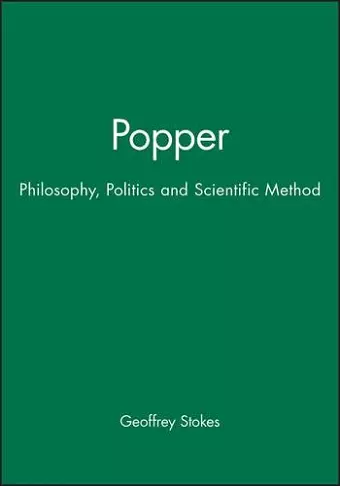Popper
Philosophy, Politics and Scientific Method
Format:Paperback
Publisher:John Wiley and Sons Ltd
Published:14th Oct '98
Currently unavailable, and unfortunately no date known when it will be back

Karl Popper is a philosopher of knowledge and politics, rationality and freedom. His ideas have won acceptance and provoked controversy among an academic as well as a more general audience. This book aims to broaden our understanding of Popper's philosophy. It is one of the few studies to present his work as an evolving "system of ideas", and to take account of the full range of his writings.
The book discusses Popper's early philosophy of politics, science and social science, as well as his later philosophy, which offers an evolutionary account of human nature and the growth of knowledge. Contrary to many earlier interpretations, Stokes argues that we should look to Popper's political values to understand the unity of his work and the evolution of his theory of knowledge and general philosophy. The chapters in this book examine Popper's arguments, and offer critical analysis of the achievements and shortcomings of his philosophy. In particular, Stokes considers the problems of rationality, politics and ethics in the context of debates between the Frankfurt School of critical theory and critical rationalism.
The book will be of interest to second-year undergraduates and above in the fields of philosophy and critical theory.
'In this masterful study, Geoffrey Stokes provides a comprehensive analysis of the interweaving of political commitments, epistemology and scientific method in the whole range of Popper's writings. By this means he offers us a careful account of the evolving structure of Popper's complex "system of ideas". In addition, Stokes points out the many reformulations as well as latent disjunctions in Popper's heroic efforts to integrate a philosophy of freedom and scientific enquiry. Another benefit of Stokes's book is a long-overdue examination of the differences and similarities in Popper's methodologies of social and natural science. At the same time, the study contains a useful overview of the clash between Popper's critical rationalism and Habermasian "critical theory".' Professor Toby E. Huff, University of Massachusetts, Dartmouth
'One of the few books to cover the debate between Popper and the Frankfurt School.' The Times Higher Education Supplement
'Geoffrey Stokes has written a thought-provoking book...it is a valuable contribution to the literature on Popper's philosophy.' Jeffrey Ketland, University of Nottingham, British Journal of Philosophy
'The reader is given a lucid account of Popper's evolving system of ideas, succinctly situating each development in its historical and intellectual context, and concluding each section with an appraisal of Popper's contribution ... [Stokes's] book is a fine contribution to that wider goal, and a lucid and balanced assessment of Popper's philosophical achievements.' Thesis Eleven
ISBN: 9780745603223
Dimensions: 231mm x 155mm x 18mm
Weight: 318g
216 pages